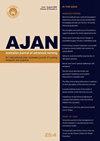Distressed, detached, devalued and determined: aged care workers’ experiences of the COVID-19 pandemic
IF 1.3
4区 医学
Q3 NURSING
引用次数: 4
Abstract
Background: The COVID-19 pandemic has had widespread impacts on the community and has demanded a rapid response from the aged care sector. System changes for infection control have been required including the use of personal protective equipment, lockdowns, visitor restrictions and changes to activities within aged care facilities. Even prior to COVID-19, the high physical and emotional demands of aged care work were recognised. Objective: This study sought to understand aged care workers’ experiences of the COVID-19 pandemic. Methods: Using a pragmatic paradigm qualitative data about work experiences during COVID-19 was collected from people employed in different aged care organisations in a range of aged care roles and settings from multiple Australian states. Data was collected using focus groups and interviews conducted online between August-October 2020. Inductive thematic analysis was used to identify key themes in the data. Results: Participants included 15 people working across a range of aged care roles including clinical, care and management staff and across both residential and community settings. Five themes were identified which characterised aged care workers thoughts about their jobs during the pandemic. These included intensified procedures and emotional demands, feeling undervalued and detached from the frontline, exposure of existing system deficiencies, recognising teamwork and increased confidence in technology. Conclusion: Reflecting on aged care workers’ experiences of COVID-19 highlights the need to better support workers and acknowledge their important role in caring for older Australians. This includes at an organisational level by providing supportive environments and access to online resources as well as at the community and policy level by recognising aged care workers as frontline workers. The COVID-19 pandemic has also highlighted existing systemic issues in the aged care sector that need to be addressed for the provision of quality aged care in Australia during the COVID-19 pandemic and into the future. What is already known about the topic? • While the COVID-19 pandemic is affecting the global community, it is disproportionately impacting the aged care sector with higher rates of severe illness and death and wide-ranging system changes to prevent and control the spread of the virus. • Prior to COVID-19, aged care work was associated with high job demands and lack of access to resources to support aged care workers in their role. • Survey data on the Australian RACF workforce found workers felt prepared for the pandemic with a wide range of measures to control the spread of COVID-19 but they faced several challenges associated with their additional roles and restrictions. What this paper adds • This paper provides qualitative and descriptive insights into the challenges experienced by the Australian aged care workforce during COVID-19 including increased workloads and intensified emotional demands of their roles while at the same time feeling undervalued by the wider community. • This study has highlighted the need to better support and acknowledge aged care workers in the community through their portrayal in the media and within their organisations by facilitating supportive team environments and providing access to online resources and training. • This paper discusses existing systemic issues that have been highlighted by COVID-19 and the Royal Commission into Aged Care Quality and Safety and need to be addressed for the wellbeing of workers and the provision of quality aged care. © 2022, Australian Nursing Federation. All rights reserved.痛苦、疏离、贬值和坚定:老年护理工作者在COVID-19大流行中的经历
背景:新冠肺炎疫情对社区产生了广泛影响,需要老年护理部门迅速做出反应。需要改变感染控制系统,包括使用个人防护设备、封锁、访客限制以及改变老年护理机构内的活动。甚至在新冠肺炎之前,老年护理工作对身体和情感的高需求就已经得到了认可。目的:本研究旨在了解老年护理人员在新冠肺炎大流行中的经历。方法:使用实用范式,从澳大利亚多个州的不同老年护理机构的工作人员中收集关于新冠肺炎期间工作经历的定性数据,这些老年护理机构具有不同的老年护理角色和环境。数据是通过焦点小组和2020年8月至10月期间进行的在线访谈收集的。归纳主题分析用于确定数据中的关键主题。结果:参与者包括15名老年护理人员,包括临床、护理和管理人员,以及居住和社区环境中的工作人员。确定了五个主题,这些主题是老年护理工作者在疫情期间对工作的思考。其中包括强化程序和情感需求、感觉被低估和脱离前线、暴露现有系统缺陷、认识到团队合作以及增强对技术的信心。结论:反思老年护理人员的新冠肺炎经历,强调需要更好地支持工作人员,并承认他们在照顾澳大利亚老年人方面的重要作用。这包括在组织层面提供支持性环境和在线资源,以及在社区和政策层面承认老年护理工作者是一线工作者。新冠肺炎大流行也突出了老年护理部门现有的系统性问题,在新冠肺炎大流行期间和未来,澳大利亚需要解决这些问题,以提供高质量的老年护理。关于这个话题,我们已经知道了什么?•尽管新冠肺炎大流行正在影响全球社会,但它对老年护理部门的影响尤为严重,重症和死亡率更高,而且为预防和控制病毒传播而进行了广泛的系统变革。•在新冠肺炎之前,老年护理工作与高工作需求和缺乏资源来支持老年护理工作者发挥作用有关。•关于澳大利亚RACF劳动力的调查数据发现,工人们对疫情做好了准备,采取了广泛的措施来控制新冠肺炎的传播,但他们面临着与额外角色和限制相关的一些挑战。本文补充内容•本文对澳大利亚老年护理人员在新冠肺炎期间所经历的挑战提供了定性和描述性的见解,包括工作量增加和对其角色的情感需求加剧,同时感到被更广泛的社区低估。•这项研究强调,需要通过媒体和组织内部对社区老年护理人员的描述,更好地支持和认可他们,为团队环境提供支持,并提供在线资源和培训。•本文讨论了新冠肺炎和皇家老年护理质量与安全委员会强调的现有系统性问题,这些问题需要为工人的福祉和提供优质老年护理而解决。©2022,澳大利亚护理联合会。保留所有权利。
本文章由计算机程序翻译,如有差异,请以英文原文为准。
求助全文
约1分钟内获得全文
求助全文
来源期刊
CiteScore
2.30
自引率
7.10%
发文量
27
审稿时长
>12 weeks
期刊介绍:
The Australian Journal of Advanced Nursing publishes a wide variety of original research, review articles, practice guidelines, and commentary relevant to nursing and midwifery practice, health- maternity- and aged- care delivery, public health, healthcare policy and funding, nursing and midwifery education, regulation, management, economics, ethics, and research methodology. Further, the journal publishes personal narratives that convey the art and spirit of nursing and midwifery.
As the official peer-reviewed journal of the ANMF, AJAN is dedicated to publishing and showcasing scholarly material of principal relevance to national nursing and midwifery professional, clinical, research, education, management, and policy audiences. Beyond AJAN’s primarily national focus, manuscripts with regional and international scope are also welcome where their contribution to knowledge and debate on key issues for nursing, midwifery, and healthcare more broadly are significant.

 求助内容:
求助内容: 应助结果提醒方式:
应助结果提醒方式:


